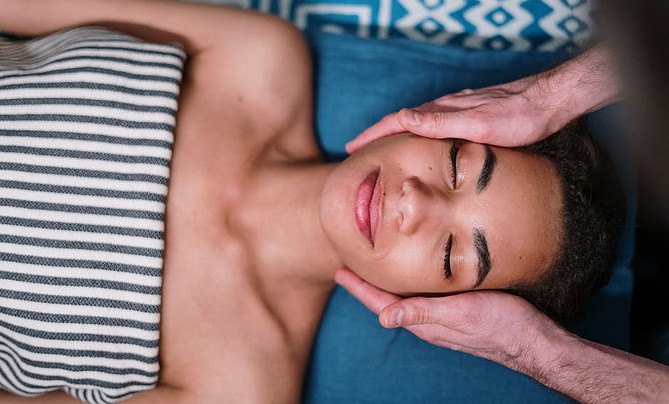One of the biggest things in ‘natural medicine’ out there is essential oils. You may have heard of them, but in case you haven’t, essential oils are oils that you sniff, rub on your skin, or occasionally put in food, and it’s targeted to help you with a specific problem. Due to the belief that these oils are “all-natural” and they promise a natural solution for a physical or mental/emotional issues you may be dealing with (the type of essential oil (the scent/flavor/etc.) people try them as a solution for most of the health conditions and symptoms. In this article, we will be looking at can essential oils cure headaches, or instead, can essential oils cause headaches.
Somehow, people tend to believe there are no risks in using essential oils given they are ‘all-natural’. However, this is not the case. They do carry risks. Let me just start this by saying, not all people get a bad reaction to essential oils, and not all oils can negatively affect someone who may have a bad reaction to one oil. It’s possible all essential oils could affect someone, but it’s not that likely.
One of the most common side effects and reactions people can experience due to essential oils, or get from essential oils, is basic headaches, as well as a worse, more severe, and typically more debilitating type of headache, more commonly known as migraine headaches.
This is just one of the side effects that essential oils can cause, but they’re the most common, and can be some of the most debilitating.
Today, as noted earlier, we’re going to dig deeper into what essential oils are, exactly what risks you are taking by using them, and why essential oils can cause headaches and migraines in some people.
So, let’s get started.
What are Essential Oils?
Let’s start with the most basic discussion to have about this topic: what an essential oil is.
If you’re reading this, it’s likely you already know what it is. But in case you don’t, this is for you.
Essential oil is basically an oil that has been extracted from a plant (or from whatever the main ingredient is).
You sniff the oil, rub it on your skin, or sometimes put in food, and it helps you with a health problem you may be having at the time. The specific purpose of the oil is dependent upon the ingredients, so each oil is different. Each one is typically named after the main ingredient in it, and where the oil originally came from.
For example, there’s peppermint oil, which is often used to boost energy and aid digestion, which is something peppermint is known for doing. There’s also a lavender oil which is meant to relieve stress, which makes sense because lavender is a soft, calming scent.
Tip: Did you know that a bracelet can help you with stress and anxiety?
So now that you know what essential oils are, let’s talk more about the types of essential oils that are out there, and what exactly they are used for. We’ve already discussed it a bit when we were discussing examples of essential oils, but there’s a lot more to talk about and dig in to. So now, let’s dig a little deeper and discuss the different types of essential oils that are out, and what exactly they are used for.
Types of Essential Oils
There are a countless number of essential oils out in the world, so today, we’ll just be discussing the most popular essential oils that people tend to buy most frequently. So, let’s start by just finding out the names of some of the most popular essential oils that are out there.
These are the oils people buy most often:
- Roman Chamomile
- Lavender
- Clary Sage
- Rose
- Ylang Ylang
- Rosemary
Now that we’ve learned the names (and the main ingredient in most of them, as you can tell what they are by their names) of the most popular types of essential oils that are out there for you to purchase, let’s discuss the specific problem or issue that each essential oil on this list is made for. In other words, basically what it’s used for, what it was specifically made to be used for.
So, let’s discuss that now.
Uses of Essential Oils
Each essential oil has a specific problem or issue that it is designed to help you with. Each type has a specific use, has a specific thing that it is targeted to help you with.
Tip: Some headaches and sinus problem can lead to high blood pressure. Here is our take on of doTERRA Essential Oils
for High Blood Pressure.
Above, we discussed different types of essential oils. Here, we will discuss the uses for those types of essential oils.
So, let’s get started.
1. Roman Chamomile
This oil is used to put your mind at ease, and relax you. There is a safety warning on this that anyone allergic to daisies, marigolds, and/or ragweed should avoid using this oil in any way.
2. Lavender
This oil is used for stress. It relaxes you and helps you control your stress level, and keep it low.
3. Clary Sage
This oil is used to help your hair and scalp, helping make your hair healthier, and helping any irritation on your scalp. It’s also very calming to skin (which makes sense, since it helps your scalp).
So, if you have irritation on your skin, Clary Sage is the way to go. It’s typically the perfect oil to use in that situation, provided that you’re not allergic.
4. Rose
This oil is used to reduce anxiety, and it can sometimes be used to treat acne, and make you look younger due to how it makes your skin look.
There’s a safety warning on this that says skin irritation can potentially occur when used topically, directly on your skin.
5. Ylang Ylang
This oil has a lot of uses. It boosts your mood, reduces depression, relieves anxiety, lowers blood pressure, and decreases heart rate.
6. Rosemary
This oil is another with many uses. It may improve brain function, increase circulation, and ease stress in certain people. But the main use of this oil is to stimulate hair growth and repel certain bugs, while keeping you and/or your surroundings smelling good.
So, now that we’ve discussed the uses for the most popular, most common essential oils that people typically buy and use, and potential side effects/reactions to a few of them.
So, let’s dig deeper into that topic, and discuss more in-depth about the side effects you may possibly experience due to using an essential oil, and the risks you are taking by using them.
Side Effects, Risks and Possible Complications of Essential Oils
The side effects you may get vary on the type of oil you are using. However, a lot of the side effects, risks, and possible complications are similar to one another, so we’re just going to discuss the key risks you are taking when using essential oils:
1. Allergic Reaction
When using an essential oil, you’re risking having an allergic reaction to the type of oil you are trying.
I’m not saying that it’s possible to have an allergic reaction to every single oil, it’s typically one, two, or a handful you may be allergic to, but you never know.
So, if you’re trying any essential oil for the first time, proceed with caution, as it may cause an allergic reaction, which can present in many different ways, but most commonly presents in a rash.
2. Side Effects
Side effects you may experience from using essential oils include drowsiness, nausea and vomiting, eye redness or irritation, coughing, shortness of breathe, and/or wheezing, and in extreme cases, they can cause seizures and hallucinations.
3. Other risks
Other risks of using essential oils include irritation and burning on your skin, asthma attacks (if you have asthma and breathe in the fumes of an essential oil, it may trigger an asthma attack), and headaches/migraines.
Yes, headaches and/or migraines are possible when using an essential oil.
Now, let’s dig deeper into that topic, and learn more about how essential oils may cause headaches and/or migraines in some people.
Tip: Here are the best foot massagers for diabetics. Remember to avoid these essential oils if you have diabetes.
Can Essential Oils Cause Migraine?
Yes. This is not a reaction that everybody has. However, it is relatively common for an essential oil to cause a migraine in some people.
For those wondering what the difference between a headache and migraine is, specifically in this situation where an essential oil is causing it, often times, along with a headache (or some times without a headache at all!), someone who has a negative reaction to an essential oil (or multiple essential oils) will get nauseous when they smell it/inhale it.
They may grow sensitive to light, sounds, and it may even feel like their head is exploding, as well as many other symptoms that can be extremely debilitating. That is a migraine. Those things don’t come with a typical headache (except, of course, the headache).
So, when trying to figure out if you have a migraine, or just a typical headache, both caused by essential oils and not, refer back to this. Ask yourself about what exactly you’re feeling, and if you have the symptoms (or one or two, or more, of them) written above, it is likely a migraine as opposed to a regular headache.
Tip: Here are the Best Essential Oils for Corns and Bunions.
Can Essential Oils Cause Headaches?
Yes, just like essential oils can cause migraines, they can indeed cause basic headaches as well, without the other symptoms that come along with an actual migraine.
Everybody reacts to essential oils differently, and technically, any of the essential oils out there can cause just about anything. Because these are scent oriented oils that are all-natural ways to help treat some basic health problems, they are more likely to cause a rash and a headache than anything else.
Due to them being oils, and the type of ingredients used to make the oils, it’s likely that if you have a reaction, it will appear on your skin in the form of a rash or hives, or it will cause a headache. You are likely to develop pain, whether it be faint or extreme, in your head, that, although headaches seem like basic things that everybody deals at some point in their life time, can actually make you very sick and can potentially be very painful.
You will get sicker if it’s a migraine, as opposed to a headache, but the pain alone from the headache can make you very sick as well. So when using essential oils, especially one you’ve never used before, just be aware that this is a reaction and/or side effect that is possible for you to have and experience.
Tip: Lightheadednes is different from dizziness. Here are the best Essential Oils for Lightheadedness.
How Essential Oils Cause Headaches?
There are a few ways essential oils can cause headaches, but it typically depends on the person.
For some people, a smell might be too strong, and so it can make the person develop a headache or migraine. Anything that has a scent is likely to give at least one person in the world a headache and/or migraine, and potentially make them nauseous along with it.
Usually, when essential oils cause headaches, as well as migraines, they are caused by the essential oil being too strong, as lots of people can’t handle such strong smells. So really, it’s the ingredients in an essential oil that cause people to have reactions, and a headache is one of those reactions that’s very possible to have, so that is usually how essential oils can cause headaches.
What To Do When Essential Oils Cause Headaches?
Well, there’s not too much you can do to assure that an essential oil that has given you a headache in the past will not give you a headache again, so the first step is to get away from the oil, and stop using that specific oil in the future, and potentially others, depending on your reaction to other oils.
The second step, after getting away from the oil and not using it again, would be to put a cold (or warm, depending on your preference and how it works for you) wash cloth on your head. This is something known to help people with headaches and migraines, and although it doesn’t rid you of the pain or any other symptoms immediately, it can relieve at least some of it over a few minutes, if you just give it the time.
For some, it might work faster than others. Some people it helps after 5 minutes, some it helps over 30 minutes, and I’m sure there are some people out there it doesn’t help at all. Still, it is something that is most likely to help, along with being in a room that’s quiet and dark, if you prefer to stay away from any medications, such as Ibuprofen, Tylenol, Aleve, Excedrin Migraine or any other pain relieve/headache/migraine medication.
How To Avoid Headaches While Using Essential Oils?
There’s no one way to make sure that you don’t get a headache while using essential oils. In fact, for the most part, if an oil gives you a headache, there’s not really any way out of that, or to make sure that it doesn’t give you a headache in the future. When using a new oil, there’s not really any way to be positive that it won’t give you a headache, or to avoid getting a headache while using it.
However, sometimes, people dilute the oil, adding some water to it. It makes it not as strong and powerful, and it lessens the scent to make it not as overwhelming, which is typically the cause of migraines when people use essential oils. So, diluting the oil makes it more tolerable for many people.
But, if you tend to get headaches with essential oils, or in general, there are specific oils that at least one of their uses and purposes is to help with headaches.
That doesn’t mean these ones definitely will not cause headaches, but they may help a headache that’s already begun, or it might just be something nice to smell, that is at least less likely to cause a headache.
These oils are:
1. Peppermint oil
2. Rosemary oil
3. Lavender oil
4. Chamomile oil
5. Eucalyptus oil
There may be more oils out there that prevent headaches, or are used as a remedy to help headaches while they’re happening, but these ones are used the most for people who struggle with headaches and/or migraines.
Obviously, regarding these oils that have a purpose of helping headaches, and every other oil that is out there, if it causes a headache, you can try diluting it, but if it causes a headache after that, probably don’t use it anymore.
Conclusion
In conclusion, even though essential oils are all-natural products, it is still possible to have a negative reaction to them, which not many people seem to realize. But it’s true.
If you have a negative reaction to an oil, whether it’s a rash, a headache/migraine, or something more serious, you should probably consider not using that oil again, or at least try diluting it, if you plan to use it again.
Essential oils, despite being all-natural products, can cause just as many side effects, allergic reaction, and other negative reactions that both over the counter and prescription medications can have. When using essential oils for the first time, or using a specific oil that you have never used before, first check to make sure there’s nothing in it that you are aware that you are allergic to, and then if there’s not, and you still use it, proceed with caution, because if you’ve never used it before, chances are you have no idea how it might affect you. There are many possible outcomes and ways it could affect you. So just be careful, and if you have a reaction to that oil, try not to use it again.
Thanks for reading!









